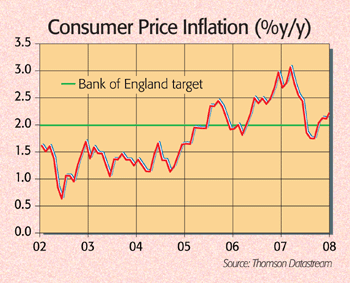
“When all else fails, clutch at straws,” said Scotland on Sunday’s Bill Jamieson. The UK economy is slowing, house prices are falling and repossessions rising. But at least consumer price index (CPI) inflation, at 2.2%, is almost in line with the Bank of England’s 2% goal. For now, that is.
The trouble is, higher prices for food, energy and imports are set to push the CPI rate higher during the year, said Bank of England governor Mervyn King on Wednesday. Last April, he had to write a letter of explanation to then Chancellor Gordon Brown, on why inflation had breached the Bank of England’s 3% upper limit. On Wednesday, he said it was now ‘odds-on’ he would be writing to his successor, Alistair Darling, this year.
What next?
That means that, even as the housing market tightens and estate agents and City pundits squeal for Federal Reserve-style rate slashing, “it will be very difficult for the bank to justify cutting rates while inflation is rising significantly above target”, ABN Amro economist Dominic White told Bloomberg. That will make life even tougher for mortgage holders, who are already feeling the squeeze. According to the Council of Mortgage Lenders, repossessions hit 27,100 in 2007, an eight-year high. And things aren’t getting any better. The Royal Institution of Chartered Surveyors said that January was the worst month for the UK housing market since 1992.
It’s not all bad, said Liam Halligan in The Sunday Telegraph. A slowdown would be “a welcome return to historic norms after the dangerous excesses of the last debt-fuelled decade”. And last week Alistair Darling said that the UK should get through the crisis rather lightly, as banks have been “more responsible in taking account of an individual’s ability to pay” when selling mortgages.
Is that true?
Not if the scale of lending is anything to go by. As Karen Ward, UK economist at HSBC, told The Observer, the UK’s housing boom has been far bigger than in the US. “House prices in this country have reached nine times average income, but in the US they only got to six.”
And banks over here still have plenty of subprime exposure to own up to, it seems. Buy-to-let lender Bradford & Bingley, which only a few weeks ago said it didn’t expect to suffer losses from subprime vehicles, such as CDOs or SIVs, this week disclosed a £94.4m impairment charge and another £50m loss on derivatives. “What does that betoken for RBS and Barclays, whose exposure to CDOs is much greater?” asked the BBC’s Robert Peston. “Nothing good.”